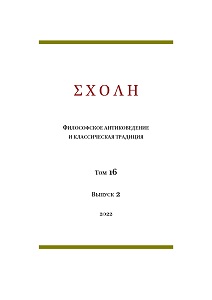Аргумент севира антиохийского об абсурдности исповедания двух природ во христе и понятие «частная природа» в структуре «арбитра»иоанна филопона: богословие и методология школьной неоплатонической философии в vi веке. Часть 1
The argument of Severus of Antioch on the absurdity of confessing two common natures in Christ and the concept of “particular nature” within the structure of the “Arbiter” by John Philoponus: theology and methodology of school Neoplatonic philosophy
Author(s): Oleg NOGOVITSINSubject(s): Christian Theology and Religion, Philosophy of Religion, 6th to 12th Centuries
Published by: Новосибирский государственный университет
Keywords: John Philoponus; Severus of Antioch; Leontius of Byzantium; Christology; Triadology; nature; substance; hypostasis; person;
Summary/Abstract: The article considers the place of the famous argument of Severus of Antioch on the absurdity of confessing two common natures in Christ in the structure of the "Arbiter" by John Philoponus. In compliance with the general formula of this argument, the confession of two natures in Christ, taken as common natures of deity and humanity, necessarily entails agreeing that the incarnation of Christ signifies the incarnation of the whole Trinity in the whole humankind, namely, the incarnation of all the hypostases of the Trinity in each human being. John Philoponus supplements it with the distinction of common and particular natures: the common essence of deity, as represented by the aggregate of particular natures (Father, Son=Word, Saint Spirit), being incarnated in Christ, would lead to the incarnation of the mentioned particular natures in the common essence of humanity, i. e. in the aggregate of all whenever lived, living now and still not come into being people. In the article, a detailed analysis is given of the functional mode of Severus’ argument and of the concept of “particular nature” in the philosophical writings of John Philoponus, as well as that of the sense and the mechanism of transmission of this concept to the theological context of his substantiation of the Monophysite Triadology and Christology. On the grounds of scrutinizing these issues, the dependence is exposed of the procedures of substantiation of theological problems, applied in the “Arbiter”, on the methodology of school Neoplatonic philosophy.
Journal: ΣΧΟΛΗ. Философское антиковедение и классическая традиция
- Issue Year: XVII/2023
- Issue No: 1
- Page Range: 177-216
- Page Count: 40
- Language: Russian

